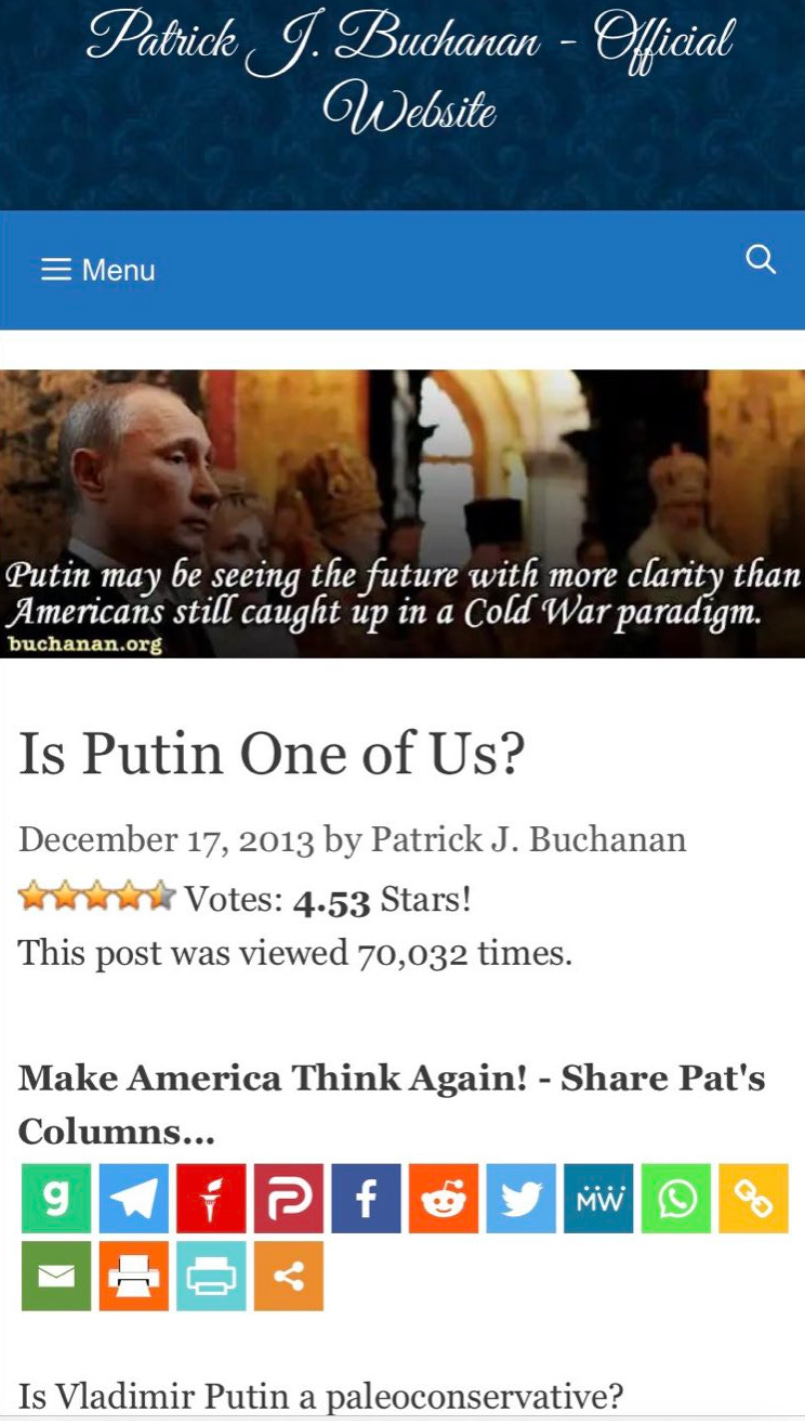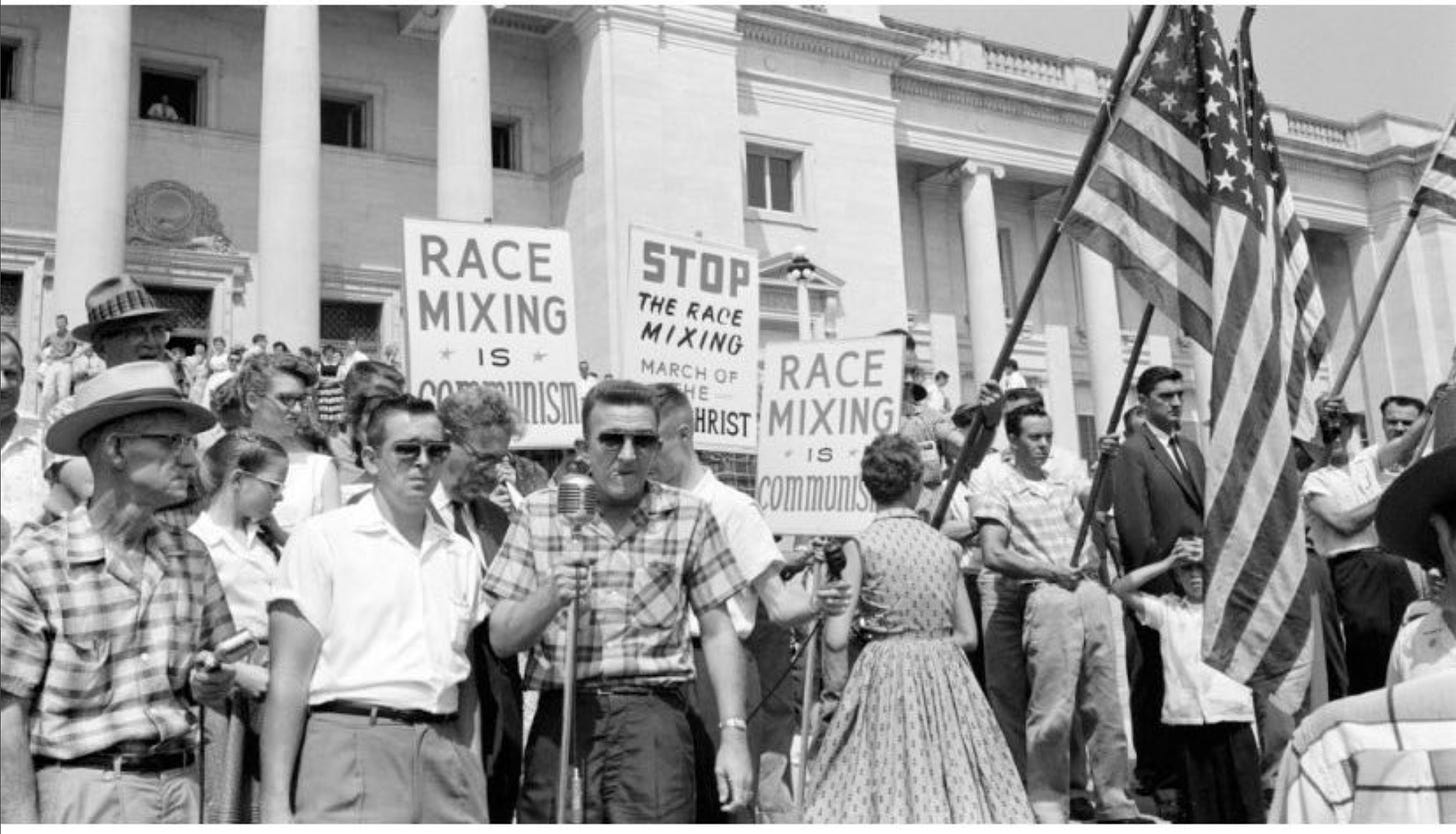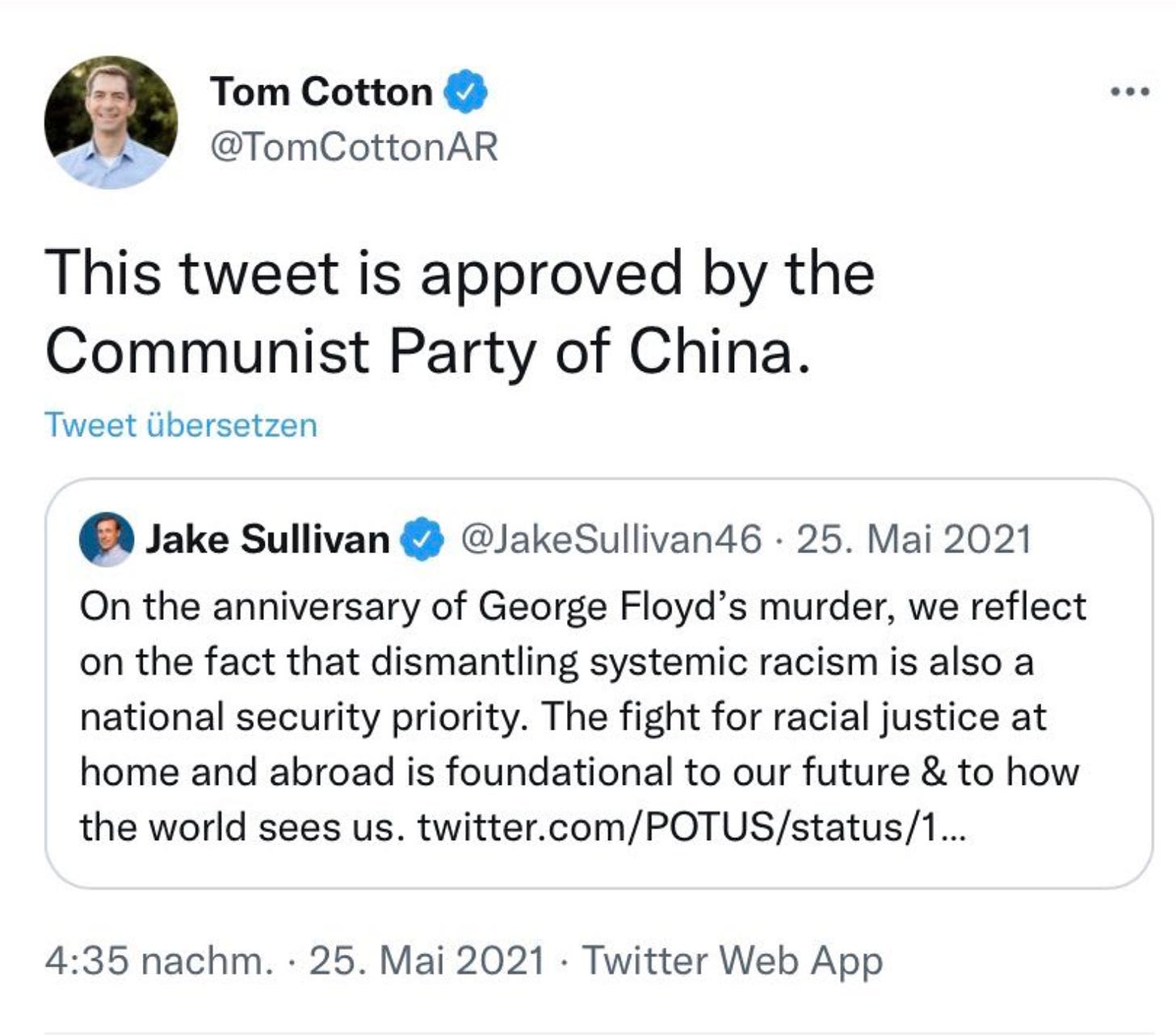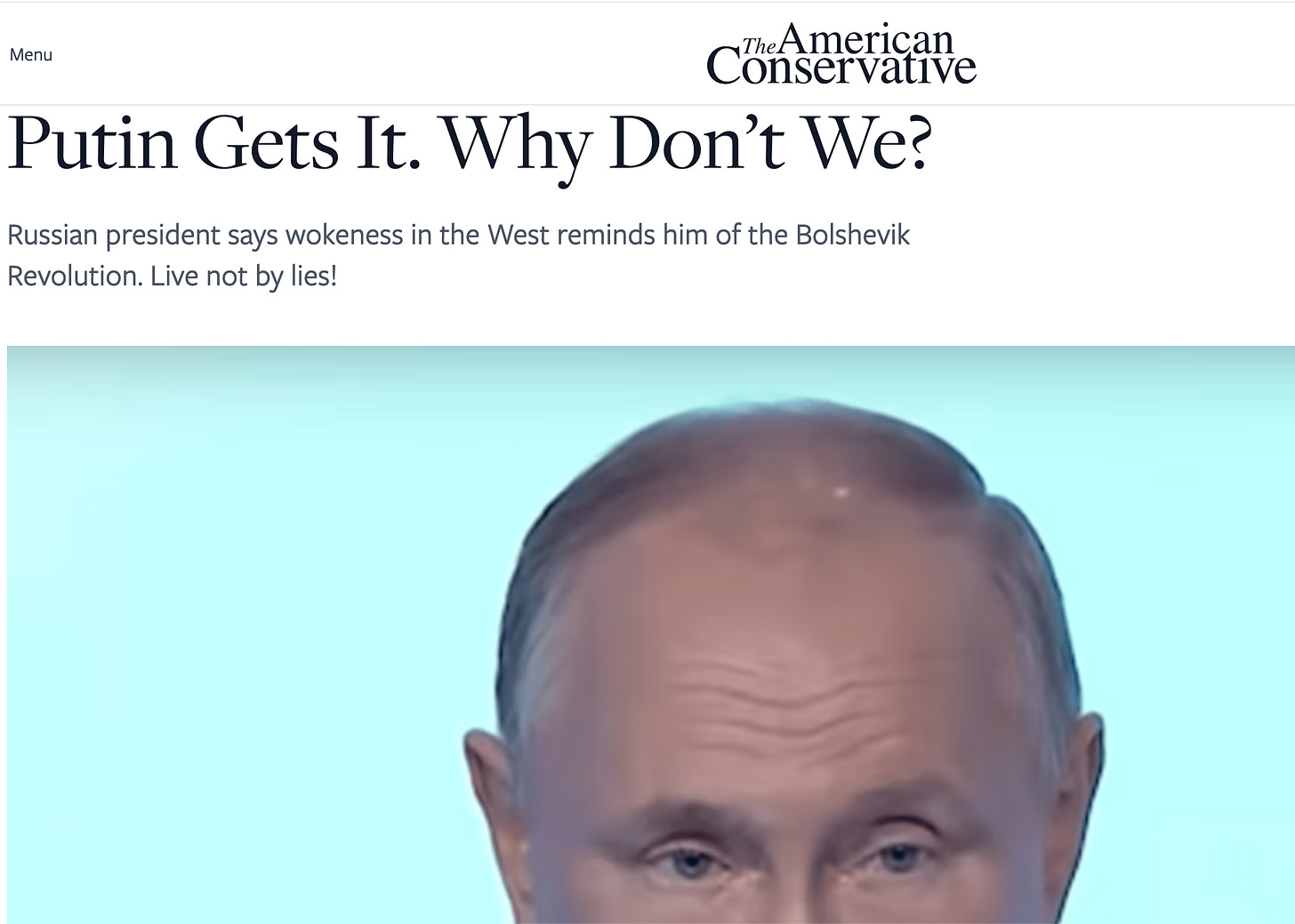Why the American Right Admires Putin's Russia
Reactionaries largely agree with Putin’s critique of the weak, “woke” West. To the Right, the fight against multiracial pluralism overrides everything else.
Quick note: I am building on something I wrote in my Guardian column in early March, right after the start of Russia’s invasion. It’s worth revisiting this topic now, in the wake of Zelenskyy’s visit to the U.S. – what follows is an updated an extended reflection on what’s behind the Right’s infatuation with Putin and other foreign autocrats.
Last week, Ukrainian president Volodymyr Zelenskyy visited the U.S. – his first international trip since the start of Russia’s invasion in late February. The visit culminated in an impassioned address to a joint session of Congress: Almost exactly 300 days into this desperate war effort, Zelenskyy thanked the U.S. and pleaded with American lawmakers to continue their support for his country.
America is divided. That’s not news. But the authoritarian ruler in the Kremlin deciding to invade a democratic neighbor – that’s the type of international crisis that traditionally might have inspired some closing of the ranks: Set differences aside, let domestic quarrels rest. Now the leader of that democracy – someone who’s become a global icon, a symbol of heroic defiance – came to Washington to tell the American people how grateful Ukrainians were for the help they have received, and how their fight entirely depended on U.S. support: It all fits the collective imaginary of a nation that has long presented itself as a beacon of freedom and liberty to the rest of the world. It should have been a celebration.
But conservatives are evidently out on the idea of patriotic unity, even in the face of a despotic war of aggression against an allied democracy. The Trumpiest of Republican elected officials, like Representatives Marjorie Taylor Greene, Lauren Boebert, and Matt Gaetz, were joined by some self-proclaimed rightwing populists and leading National Conservatives, like Senator Josh Hawley, in demonstrating their disdain for America’s support for Ukraine.
Tucker Carlson, the Right’s leading media extremist, went much further and treated his audience to what was, even by Tucker’s exquisite standards, a rather unhinged tirade – calling Zelenskyy “the Ukrainian strip club manager” (for supposedly failing to dress appropriately) and raging against continued U.S. help. Carlson always rants, that’s his thing; the whole purpose of his show is to keep the base riled up about an assortment of threats from “the Left.” Quite frequently, it's clear he’s just playing the part, adopting his activist persona, Tucker Carlson filling the role of “Tucker Carlson.” But this, as many observers have rightfully noted, was not *just* propaganda – Carlson really seems to hate Zelenskyy.
Carlson’s rant is a reminder that significant portions of the Right are not on board with America’s support for a European democracy fighting for freedom and national survival, that quite a few rightwingers, not just on the fringe of conservative politics, can’t seem to shake their admiration for Putin and the cause he supposedly represents. It really is worth diving into the reasons behind this continued love for foreign autocrats, and the one in the Kremlin in particular, as it provides a window into some of the pillars of the worldview that currently animates the American Right: The desire for a white Christian ethno-religious state and the paranoid hatred for “wokeism” – all of it building on long-standing anti-democratic tendencies and impulses that have defined modern conservatism as a political project since its inception in the middle decades of the twentieth century.
The Right’s reactions to Russia’s attack on Ukraine have ranged from blatant admiration for Putin to anti-Russian saber-rattling combined with a shrill critique of President Joe Biden. Back in February, Donald Trump initially called the invasion “genius”; he then added that NATO was “not so smart” and “our leaders are dumb.” Meanwhile, Tucker Carlson’s immediate reaction to the invasion was to ridicule American solidarity with Ukraine, a country he derided as “a tyranny,” led by “the people who paid off Joe Biden’s family.”
Among the more prominent figures on the Right, Trump and Carlson were perhaps crasser and more explicit than most, but in the general sentiment they expressed, they certainly weren’t outliers. In the days immediately after the start of Russia’s invasion, prominent Republicans gathered at the Conservative Political Action Conference (CPAC) in Florida and focused their ire on Joe Biden’s supposed weakness as the real cause for Putin’s aggression. They also left no doubt who they considered the biggest threat - the “enemy within,” as Senator Rick Scott put it: the “militant left wing in our country.” That’s as close to a consensus position as the Right has developed on anything these days: However bad Putin may be, the “woke” radicals at home are worse.
It is true that outside the most extreme, most openly white power / fascistic far-right circles, most conservatives backpedaled to some degree, especially when it became clear they had severely overestimated Russia’s strength, underestimated Ukraine’s resolve, and failed to take into account that public opinion in the U.S. was staunchly on the side of the Ukrainian defense. In general, we shouldn’t overemphasize the cohesion of the Right’s response. Almost across the political spectrum, and certainly including the liberal camp, the war in Ukraine has offered an opportunity to re-discover the dangerous comfort of familiar Cold War categories; America, many seem content to believe, is back to fighting the evil Russian empire, the way it should have always been.
But the fact remains that even among conservatives who now want to defeat Russia (or at least claim they do), Putin’s diagnosis and critique of the weak, “woke” West is widely shared and endlessly repeated. Openly siding with Putin in this war is not GOP mainstream – siding with his critique of “woke” leftwing forces as the central threat to the nation very much is. That is hugely significant, as it reveals so much about the Right’s animating vision for American society.
It may feel shocking, but it shouldn’t be surprising that many Republican leaders and conservative elites think the American President is a more dangerous enemy than the Russian autocrat. There is an influential tradition on the Right of admiring Russia in general and of idolizing Putin specifically, as a defender of white Christian values against the onslaught of secular, “leftist” liberalism. In the Obama era, the conservative media machine loved to fawn over Putin as the very white, very macho, very alpha (in that stupidly toxic, riding-a-horse-shirtless kind of way) counterpart to Obama.
Both reactionary intellectual sphere and religious conservatives were in too: In 2013, for instance, Pat Buchanan, a leading voice on the “paleoconservative” traditionalist Right, described Putin as “One of Us,” an ally in what he saw as the defining struggle of our era, “with conservatives and traditionalists in every country arrayed against the militant secularism of a multicultural and transnational elite.” Similarly, in 2014, famous evangelist Franklin Graham lauded Putin for having “taken a stand to protect his nation’s children from the damaging effects of any gay and lesbian agenda” – an agenda Barack Obama was supposedly pursuing in the U.S.
Some of the liberal confusion over the pervasive sympathy for Putin on the Right probably stems from the fact that conservatives still love to rail against the omnipresent threat of Communism – while adoring the Russian autocrat who is an ex-KGB officer and therefore often associated with what is so deeply ingrained in the American collective imaginary as the evil empire. Shouldn’t this bother more people on the Right?
The obvious answer to this question is that Russia is not the Soviet Union. Whatever the precise definition of the kind of autocracy Russia has become, it’s certainly not to be found on the leftwing political spectrum; Putin is not a lefty (isn’t that the kind of savvy, deep insight for which you are here? Ha!). Analytically, the Right is actually quite correct in perceiving the prevailing system in Russia as a kind of authoritarianism defined by an ethno-religious understanding of the nation and a social order that combines patriarchal traditionalism with oligarchic dominance. I am certainly painting with a broad brush here – and while the resulting picture may not quite do justice to Russian reality, it certainly captures what the American Right has seen in Russia for quite some time. It’s a vision U.S reactionaries find very attractive – close to what they want to impose on the whole country as the natural and/or divinely ordained order.
Since the end of the Cold War, prominent people on the Right have actually been quite explicit in articulating this vision and why Russia fits the bill. From the 1940s through the late 1980s, the Cold War confrontation restricted the realm of what was acceptable in the mainstream political discourse. America was fighting for freedom and democracy in the world, those were the highest, non-negotiable goods (I am talking about political rhetoric – this obviously doesn’t hold up as an empirical assessment of U.S. foreign policy and America’s role in the post-1945 world.). But after the fall of the Soviet Union, the paleoconservative tradition that had always been skeptical about this Cold War consensus – not skeptical about fighting Commies, but out on foreign obligations in the name of liberalism and democracy – moved a lot closer to the center of conservative politics. As Nicole Hemmer dissects so brilliantly in her latest book, rightwingers like Pat Buchanan started openly questioning the commitment to democracy. Their allegiance had always been to a traditional order of white Christian patriarchal rule – and Buchanan was quite adamant that democracy was simply not the best way to uphold that; as America’s demographics were rapidly changing, it was actually becoming an acute threat. These reactionaries had always looked elsewhere for inspiration: to Franco-Spain, or Apartheid-South Africa. Now, they increasingly looked to Russia.
The transition from “evil Commie empire” to “white Christian Russia” was rather effortless. Once we look closer into what, exactly, conservative anti-“Communism” has been all about during and since the end of the Cold War, it becomes clear why the path to accepting Russia and Putin as role models was not quite as arduous as the rabidly anti-Communist rhetoric might mislead us to believe. Even at the height of the Cold War, when they invoked the specter of “Communism,” conservatives didn’t just talk about a foreign threat. Anti-“Communism” was always also, and often predominantly, an anti-liberal stance against the “leftist” enemy within. It was never just directed at anything that reasonably qualifies as communist, from an analytical standpoint.
Civil rights for Black people were Communist, arch-segregationist Strom Thurmond would tell his audience. And here is a famous photo taken at the Little Rock, Arkansas state capitol, in August 1959 – the “Communist Race Mixing” in question was the integration of Little Rock’s Central High School (from a Library of Congress collection):
Finally, here is Senator Tom Cotton in May 2021 with a current version of the “Dismantling systemic racism is Communism” idea:
Conservatives have always derided anything that threatens the social and racial hierarchy, any sort of leveling attempt, as "Communism," “Socialism,” or “Marxism,” and used the term to demonize anyone who dares to question the righteousness of past, present, or future white reactionary elite rule. Based on this specific understanding of what the danger of “Communism” actually was/is, it is perfectly consistent to rail against Communism while admiring the ex-KGB officer in the Kremlin for his willingness to uphold traditional hierarchies by whatever means.
As is so often the case, what happened after 2016 was not caused by Trump – but his rise exacerbated these long-standing trends and tendencies. With Trumpism in power, the simmering admiration for Putin morphed into GOP orthodoxy. Among voters in general, support for Donald Trump correlates strongly with a favorable opinion of Putin, and Americans who define the U.S. as a “Christian nation” have a much more favorable view of Putin’s Russia. As recently as January 2022, Putin had a significantly higher approval rating among Republicans than Joe Biden.
Such authoritarian, white Christian nationalist, anti-“Left” leanings have informed the Right’s reaction to Russia’s invasion of Ukraine. They were particularly blunt early on. The Far Right was immediately all in on Putin – Steve Bannon, for instance, declared his support because “Putin ain’t woke, he is anti-woke.” On the Christian nationalist wing of the Republican Party, Lauren Witzke, the Delaware GOP's candidate for Senate in 2020, proudly declared that she supported Putin because he supposedly protects “our Christian values. I identify more with Russian, with Putin’s Christian values than I do with Joe Biden.” Not to be outdone, Arizona state Senator Wendy Rogers emphasized that “I stand with Christians worldwide and not the global bankers who are shoving godlessness and degeneracy in our face”; in case it wasn’t entirely clear whose side she was on, she added that Ukrainian president Zelenskyy, who is Jewish, was “a globalist puppet for Soros and the Clintons.”
Tucker Carlson, finally, representative of a whole phalanx of rightwing media activists, boldly declared in the days before the invasion why his problem was not with Russia: “Has Putin ever called me a racist? Has he threatened to get me fired for disagreeing with him?” The message was clear: The real threat was the “woke” cancel mob at home, not the staunch defender of Christian values abroad.
Conservatives are displaying a strong affinity with what they see as Putin’s key project of preserving Russia as a “strong” white Christian patriarchy - in opposition to the multicultural, pluralistic hellhole into which “the West” is supposedly degenerating at alarming speed. That hasn’t changed since the invasion of Ukraine: I see no sign of introspection, no critical self-reflection, no “Maybe we need to talk about why we’ve been so enamored with this guy’s strongman Christian nationalism, and that of other autocrats like Orbán as well” voices.
Vladimir Putin understands his appeal to Western reactionaries precisely. He likes to present himself as an ally in the fight against “wokeism.” In a much-publicized speech in October 2021, for instance, he attacked “cancel culture” and the West’s supposed obsession with trans rights, called the teaching of gender fluidity “on the verge of a crime against humanity,” railed against “reverse discrimination against the majority in the interests of minorities,” and emphasized his love for traditional “family values.”
(Quick tangent: “Putin is not a real Christian” is an objection – or rather: indignant reflex – that I have often encountered. It’s not helpful. In general, equating the term “Christian” with “good” is a form of Christian supremacism we should avoid. We are not talking about textbook definitions, but political realities. Christian is what Christians do; and we need to pay attention to white Christian nationalism as a political project. More specifically, the question of Vladimir Putin’s personal religiosity, of whether or not he “truly” believes and what he believes in, is irrelevant. What is important is the place of Christianity in his nationalistic project, and how he’s been perceived on the Right.)
Putin’s anti-woke exploits have often gotten him glowing reviews from conservative commentators and intellectuals. Seems like I’m quoting Rod Dreher, senior editor at the American Conservative, in most of my explorations of what is happening on the Right – but when you are examining the reactionary admiration for foreign autocrats, there is really no better object of study than Rod. In reaction to Putin’s tirade against “wokeism,” Dreher wrote in October 2021: “Putin, Orban, and all the illiberal leaders that our baizuocracy loves to hate are all completely clear and completely correct on the society-destroying nature of wokeness and postliberal leftism.” And he has not been shy about his disdain for the West’s support for Ukraine: “I adamantly oppose risking the lives of boys from Louisiana and Alabama to make the Donbass safe for genderqueers and migrants.” In other words, it’s not that Dreher wants to see Putin win, necessarily – he just shares his contempt for America’s “woke” culture.
There it is again, the current dogma on the Right, the only position that truly matters: A radically “Un-American” woke Left is out to destroy the country – and has already succeeded in undermining the nation considerably, especially its “woke, emasculated military,” as Texas Senator Ted Cruz put it; a weak West foolishly “focused on expanding its national debt and exploding the gender binary,” according to rightwing activist Ben Shapiro.
None of the conservatives and rightwingers who have been professing their sympathy for Putin seem to know much about Russia or care about the specific causes and dynamics of what is going on in Ukraine. What matters to them is an imagined Russia: a stronghold of white patriarchal Christianity, where men still get to be real men. They also love how autocrats like Putin and Orbán glorify their nations’ past and forcefully push back against those cunning “globalists.” To Western reactionaries, the imagined versions of “Russia” and “Hungary” have become models of how to organize society and deal with the real “leftist” enemy.
The American Right does not stand alone with its reaction to Putin’s invasion. Across the West, far-right and reactionary movements have similarly oscillated between openly siding with Russia and condemning Putin while fully agreeing with his general critique. Right-wing politicians in Switzerland, conservative commentators in Germany, reactionary monarchists in the UK: wherever you look, the same diagnosis: The West had it coming, weakened by liberal decadence and “woke-culture.”
The transnational right-wing admiration for autocrats like Putin and Orbán is a crucial reminder that the struggle over democracy and multiracial pluralism is indeed playing out not just in the U.S., and that the reactionary counter-mobilization is an international phenomenon. It’s also why, conversely, rightwing movements across the world have been obsessed with Trump. They rejoiced in 2016, because they saw his election as proof that the forces of reaction would ultimately prevail. Trump, in this interpretation, was seen as evidence that any attempt to install multiracial pluralistic democracy would spark a backlash strong enough to defeat the nefarious forces of liberalism - Trump was supposed to stem the tide.
In a way, the escalating obsession with foreign autocrats is a reaction to Trump’s failure to make good on that promise. If not Trump, then who? Reactionaries are looking elsewhere. Many, like Rod Dreher, believe that Putin and Orbán have shown the way forward: “They grasp that this is a civilizational struggle, and that they are not just dealing with opponents, but with very powerful people who push an agenda that is tearing our societies apart.”
Rightwingers everywhere understand the transnational dimension as well as the world-historic significance of the current fight over democracy more clearly than many people on the Left: Is it possible to establish a stable multiracial, pluralistic democracy? Such a political, social, and cultural order has indeed never existed. There have been several stable, fairly liberal democracies – but either they have been culturally and ethnically homogeneous to begin with; or there has always been a pretty clearly defined ruling group: a white man’s democracy, a racial caste democracy, a “herrenvolk” democracy. A truly egalitarian multiracial, pluralistic democracy in which an individual’s status was not determined to a significant degree by race, gender, or religion? I don’t think that’s ever been achieved anywhere. It’s a vision that reactionaries abhor – to them, it would be the end of “Western civilization.” And they are determined to fight back by whatever means necessary.








Thank you. This is excellent.
An essential part of this white multi-nationalism is demonization of vulnerable groups, and there is no better example than the Abbott and DeSantis migrant "stunts" -- paradigmatic de-humanization of a group for political purposes
And yet, five days after Abbott's bus drop in the cold, it hardly makes a ripple. Gratuitously cruel actions must be met with sustained moral outrage, and failure of a sufficient response to Governor DeSantis’s similar stunt last September emboldened Abbott's even more barbaric act.
Every institution -- academic, media, legal, the arts should be continually protesting against this. Otherwise, it is normalized.
Btw -- did you have a chance to read my response on your prior post on the reactionary right? It relates to the balance between recognizing male white privilege and showing the non-elite white males how racism is dividing those of us with common interests. This is the only way to achieve a pluralist multi-racial society.
Thanks
Peter
No matter how many times I read explanations of the mindset of people like Rod Dreher, it still boggles my mind. It's so removed from actual facts. The “left is taking over the country” is such a crazy, nonsensical fact-free interpretation. I don't understand how they jibe their autocratic religious vision of the US with our actual history and origins as a place where people came for religious freedom. Why does giving gay and trans people rights freak them out so much? I just don't get it. It's 2022, not 1910. Civil rights have been around for over 50 years! That seems like enough time to get used to traditionally oppressed people having equal rights. It didn’t feel like there was this much protest against civil rights decades ago (I'm old) and now there's this radical extremist faction taking over the Republican Party. It’s still extremely weird and retrograde to me. I will never understand why they're so threatened or why they think it's justifiable to take away basic human rights for huge swathes of the population.